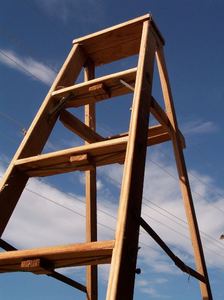- Free Initial Consultation: (954) 761-3641 Tap Here To Call Us
Coba v. Tricam Indus., Inc. – Defective Ladder Lawsuit Before Florida Supreme Court
As consumers, we trust the products we buy and use are safe as designed and manufactured. Unfortunately, this is too often not the case. From baby cribs to automobiles to construction equipment to medical devices, thousands of people are hurt every year as a result of defective products.

Those injured by dangerous and defective products may explore the possibility of a product liability lawsuit against the entity that designed the product, the manufacturer, the distributor or the maintenance company. Relevant defendants in a case will depend heavily on the underlying facts.
In the recent Florida Supreme Court case of Coba v. Tricam Indus., Inc., the allegedly defective product was a ladder, on which decedent fell, resulting in his death. more After a jury decided the case in favor of plaintiffs, defendants sough to set aside the verdict. Trial court denied this request, but the Third District Court of Appeals reversed based on the fundamental nature exception to the general rule of timely objection. The Florida Supreme Court again reversed, backing the trial court’s ruling, finding timely objection is imperative.
Ultimately, this means plaintiffs prevailed in their claim.
This case was just one of many that involve falls from ladders in the U.S. The Centers for Disease Control and Prevention indicated falls were a top cause of unintentional injury and mortality nationally, with 43 percent of fatal falls from 2004 to 2014 involving a ladder.
As our defective product attorneys in Fort Lauderdale can explain, whether liability may be conferred to a ladder manufacturer will heavily depend on whether it was being appropriately used at the time, how the device failed and whether the designers/makers of the ladder issued any warning regarding the risk that particular failure. Even when warnings are issued, there could be a valid claim asserting dangerous design.
In this case, decedent died after falling from a 13-foot aluminum ladder. His daughter, as personal representative of his estate, sued the manufacturer of the ladder and the retailer that sold it. The allegation was both entities were strictly liable because they had designed, manufactured, marketed, distributed and/or sold a ladder that was defective and dangerous. Plaintiff also asserted negligence for failure to use reasonable care to market, sell and distribute the ladder in reasonably safe condition.
Plaintiff’s presented an expert witness who was a consulting engineer and accident reconstructionist. He testified the ladder falsely appeared to be locked into position, even when it was not. The ladder might momentarily hold a person’s weight, which would give a false sense of security. In this case, this is what is alleged to have happened. The ladder ultimately fell forward and decedent fell backward onto his head.
Jurors found defendants 20 percent liable and decedent 80 percent liable for the accident. Although they awarded no damages for medical and funeral expenses, they did award $70,000 to one daughter for loss of support and services and $1.5 million to another for loss of parental companionship and pain and suffering (she had witnessed the accident).
Neither side objected to the verdict. Jurors were dismissed. It was only then defense filed a motion to set aside the verdict, arguing there could be no finding of negligent design without a finding that a design defect contributed to the fall and jurors had found there was no defect.
Defense might have had a point, but the motion should have been filed before jurors were dismissed. Because it was not, trial court – and ultimately the state supreme court – upheld the juror’s verdict.
Call Fort Lauderdale Injury Attorney Richard Ansara at (954) 761-4011. Serving Broward, Miami-Dade and Palm Beach counties.
Additional Resources: Coba v. Tricam Indus., Inc., May 14, 2015, Florida Supreme Court More Blog Entries: Jones v. Alayon – Seat Belt Defense in Florida Car Accident Lawsuit, April 26, 2015, Fort Lauderdale Injury Attorney Blog













